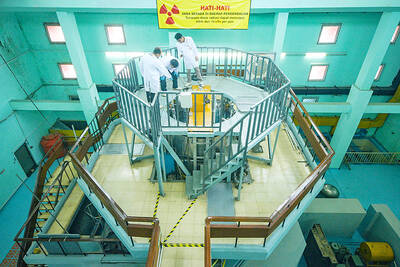Eleven Philippine policemen appeared at a disciplinary hearing yesterday over a torture video allegedly filmed on a mobile phone at a police station in a Manila slum.
The graphic recording, which has enraged the public since it was broadcast on national television on Tuesday, showed a man in civilian clothes whipping a naked man writhing on a white tiled floor. In between blows, the torturer yanked a rope that appeared to be tied to the victim’s penis.
Chief Superintendent Roberto Rongavilla, head of a police task force investigating the incident, said a formal complaint against the policemen had been read at a police internal affairs hearing.
“These people are now in the custody of the Manila police,” he said.
All 11 men had been posted at the Asuncion community police precinct in the high-crime Manila slum district of Tondo, but were suspended after a public outcry over the video sparked a government investigation.
Rongavilla said the officer featured in the torture video was the former commander of the precinct. Local news reports said he had denied the allegations.
Rongavilla said the naked man was a suspected robber whose wife had reported him missing since March.
“He was part of a group engaged in holdups and bag-snatching,” Rongavilla said. “It appears some other members of the gang had been killed in clashes with the police.”
Local television network ABS-CBN, which broadcast the clip, said an unnamed informant filmed the scene with a mobile phone, but it was unclear when it was taken.
Rongavilla told ABS-CBN that the investigation would also look into allegations that the officer accused of torturing the naked man had committed similar offenses.
“Many people are coming out alleging that their sons and husbands had been given similar treatment,” he added.

Four people jailed in the landmark Hong Kong national security trial of "47 democrats" accused of conspiracy to commit subversion were freed today after more than four years behind bars, the second group to be released in a month. Among those freed was long-time political and LGBTQ activist Jimmy Sham (岑子杰), who also led one of Hong Kong’s largest pro-democracy groups, the Civil Human Rights Front, which disbanded in 2021. "Let me spend some time with my family," Sham said after arriving at his home in the Kowloon district of Jordan. "I don’t know how to plan ahead because, to me, it feels

Poland is set to hold a presidential runoff election today between two candidates offering starkly different visions for the country’s future. The winner would succeed Polish President Andrzej Duda, a conservative who is finishing his second and final term. The outcome would determine whether Poland embraces a nationalist populist trajectory or pivots more fully toward liberal, pro-European policies. An exit poll by Ipsos would be released when polls close today at 9pm local time, with a margin of error of plus or minus 2 percentage points. Final results are expected tomorrow. Whoever wins can be expected to either help or hinder the

North Korea has detained another official over last week’s failed launch of a warship, which damaged the naval destroyer, state media reported yesterday. Pyongyang announced “a serious accident” at Wednesday last week’s launch ceremony, which crushed sections of the bottom of the new destroyer. North Korean leader Kim Jong-un called the mishap a “criminal act caused by absolute carelessness.” Ri Hyong-son, vice department director of the Munitions Industry Department of the Party Central Committee, was summoned and detained on Sunday, the Korean Central News Agency (KCNA) reported. He was “greatly responsible for the occurrence of the serious accident,” it said. Ri is the fourth person

SKEPTICAL: Given the challenges, which include waste disposal and potential domestic opposition, experts warn that the 2032 nuclear timeline is overambitious Indonesia is hoping going nuclear can help it meet soaring energy demand while taming emissions, but faces serious challenges to its goal of a first small modular reactor by 2032. Its first experiment with nuclear energy dates to February 1965, when then-Indonesian president Sukarno inaugurated a test reactor. Sixty years later, Southeast Asia’s largest economy has three research reactors, but no nuclear power plants for electricity. Abundant reserves of polluting coal have so far met the enormous archipelago’s energy needs, but “nuclear will be necessary to constrain the rise of and eventually reduce emissions,” said Philip Andrews-Speed, a senior research fellow at the